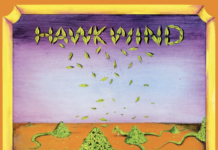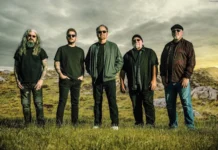THE ENID are a progressive British rock group set up by former Barclay James Harvest music director and the Royal College of Music composer and pianist Robert John Godfrey.
Founded in 1973, RJG is one of only two original members still present in the 2016 line-up (the long-serving drummer Dave Storey worked on the band’s debut album.) Other key members in the early days included Francis Lickerish (guitars) and Steve Stewart ( guitars and bass).
We met with RJG in the splendid rock ‘n’ roll Sanctum Soho Hotel which were, on very day we met, about to show-off for the first time, their fabulous “lost photograph” of Jimi Hendrix. It will take a place of honour in the aesthetically pleasing reception area of the hotel, to accompany their famous stained glass Jimi Hendrix artwork.
We had arranged to meet with Robert John Godfrey to discuss the new ENID album titled DUST — the third and final chapter of a trilogy that started in 2010 with ‘Journey’s End’ followed by ‘Invicta’ in 2012.
DUST is The Enid’s 14th studio record and will be out April 1st 2016.
Was it always meant to be a Trilogy?
“I knew it couldn’t be one part and I had a loose plan… I knew what Journey’s End would be about and I knew I’d do it it in three parts. But, as far as the content is concerned —though I had a plan about the ingredients — rather like a chef would have, I didn’t actually have any idea how I was gonna “cook it” … and then some new ingredients showed up… in the form of Joe…” [Payne, vocals.]
You didn’t really imagine you would be writing vocal works?
 “Well I did In the very early days… because we [originally] had a vocalist but he unfortunately killed himself in 1975 [In The Region Of The Summer Stars was originally composed as a largely vocal album, but the band’s singer Peter Roberts killed himself on New Year’s Day.] And the band were faced with with the question “What do we do now?” We’ve got studios booked, we’ve got a backer… we were living in an extended family of people and I felt I was responsible for looking after them, and so it was a question of, well — to keep us all together — to give us some sort of chance of a life, let’s carry on with this band. See what happens. And what has happened is where we are now! ”
“Well I did In the very early days… because we [originally] had a vocalist but he unfortunately killed himself in 1975 [In The Region Of The Summer Stars was originally composed as a largely vocal album, but the band’s singer Peter Roberts killed himself on New Year’s Day.] And the band were faced with with the question “What do we do now?” We’ve got studios booked, we’ve got a backer… we were living in an extended family of people and I felt I was responsible for looking after them, and so it was a question of, well — to keep us all together — to give us some sort of chance of a life, let’s carry on with this band. See what happens. And what has happened is where we are now! ”
So you kept it together as a family?
“Yes, it was very common in the 1960s and into the early 1970s for bands to be sharing flats and houses together. YES did it — they had to… it was the only way they could manage — PINK FLOYD did it, ERIC CLAPTON had a place which became The Pheasantry in the King’s Road, London [they hosted gigs by Lou Reed, Queen and Hawkwind in the early days] and in fact countless bands did this… they often rented farmhouses, for example, to live in and to work from. To concentrate on their music. It was the only way…”
Is it still the only way?
“Well, we live in a world now that is very resistant to the concept of extended family (of people who are not related to each other) but the benefits of it, a bit like the European Union, is a kind of “shared sovereignty” that you “give up” some of your privacy to make room for other people… so the benefits — not just financial — but also social… Of being able to all sit around a single fire or at a single dinner table eating the same meal together … are clear. It’s a good alternative way of doing things and in the case of The Enid we have had to do things that way…”
Because of finances?
“Well, at least since the days when it was possible to get massive financial support from major record companies — to enable you to go into the studio and record five crap albums before you got a hit one — at least band’s like Pink Floyd were able to get into a studio and experiment.”
“Back in those days record companies were music lovers first. And corporate people second. And so when the label saw Pink Floyd they must have said, “Well, here’s a talented bunch of good looking boys… we don’t understand the scene … so let’s just put some investment into this and see what happens.”
“EMI funded a lot of stuff that perhaps didn’t get anywhere, by adopting this method, but they also funded a lot of bloody good stuff too. But by the time The Enid came along and punk had arrived… the music business had started to become commoditized in a way where it hadn’t been before.”
Commoditized ?
“Yes, hitherto the record buying public was largely confined to those people who had been sufficiently interested in music of all kinds to go and buy a Dansette record player or a Dynatron radiogram if you had the funds. Gradually, hi-fi began to be marketed as furniture. And that started the whole thing of “coffee table albums” (rather like the encyclopedia business of the 1950s) — first of all people come and try to sell you a bookshelf and then later they come along and sell you the Encyclopædia Britannica — so you could have these things on your shelf, to improve the home….”
“So we then had a record business that was more interested in selling records to consumers than in the music. And The Enid came along just at a time when the business was going through that change… so we had to find a different business model and I think the reason why I won my Visionary Award [Progressive Music Awards 2014] was probably not because of my views about life and death, but because I had the foresight to see that it was possible to do a “crowdfunding” thing back in the early days — the 1980s — before anybody had done any of this. And this pointed the way ahead for [British Prog Rock band] Marillion for example — who having been very unfairly “chucked out” — I think — from their label, found themselves in a difficult position and thought to themselves “Well, we have seen The Enid doing this for themselves… we can do it too.” So they were able to take this crowdfunding model to move ahead.”
“Now, I am not sure how much longer crowd-funding will remain a sensible way of going about things… but at the moment it is the right way to do it. For us, certainly.”
And the nice thing about crowdfunding, in our opinion, is that you take along the fans with you. On your journey of discovery… They are, by the very nature of the model that you propose, your partners in delivering fresh music …
“Well that’s right… That’s the reason why I am stepping down on 2nd April is so that I can join “My Family” which are my fans… And I am going to go there to spend the rest of my days with them. And trying to forge a fairly small community of very generous supporters — largely middle aged — and I need to increase that fan-base too. Because, otherwise, we cannot survive. For example, we’ve done all the figures and, apparently, after all our activities this year… after we have sold-out all our shows, when we have sold every record we think we’re gonna sell and sold all our merchandise (and taking into account the support we get from the Enidi) … We are still only going to make a profit of six hundred pounds!
“So we have got to do something [RJG hits the arms of his chair emphatically as he makes his point] about increasing membership. Where that is going to come from? It will come from a younger audience … and I want to help to motivate that…”
How did you get into the prog-rock scene?
“Well, I got thrown out of the Royal College of Music for rolling… for skinning up. And, of course I wasn’t trying to be rock ‘n’ roll… I was simply trying to become a concert pianist. But it’s true I did have friends who were fairly naughty…”
“At about that time I knew Kit Lambert (manager of The Who) who I knew because he was the son of a very famous British composer … Kit was a producer for The Who and he ran a record label together with Terence Stamp’s brother [Chris Stamp ] and that was really almost my first “intro” into the “other world” of non-classical music. But I was very into it as far as the culture was concerned… I was intrigued by all this stuff that was going on. And then I found myself living next door to Peter Jenner and Andrew King [managers and producers for PINK FLOYD.] They had [rock music management company] Blackhill Enterprises. When I met them they had just stopped managing PINK FLOYD but they had a few other bands and BARCLAY JAMES HARVEST were one of those… And so, through Barclay James Harvest, I met Norman Smith [engineer at EMI who worked on studio albums for PINK FLOYD] and I had an opportunity to start learning about the recording side of things.”
What is your main message to readers, today?
“My generation has made a big mess of this world. And the people who are going to have to clean it up are the people who have just left school and university. There’s a proportion of those people that I’m interested in … They are sensitive, they’re intelligent and they are the ones who are going to be capable of trying to tackle some of our problems.”
“So therefore [in prog music] I want to get all away from this “Fairies at the bottom of the garden” attitude…”
“The thing that pisses me off so much about the prog scene is that it is “all about” muso rock. It’s all about people like Steve Wilson who possess all the talent and all the production genius (and has made a great name for himself) … but who offer absolutely no content that is memorable or meaningful. And Steve Wilson is just one of a whole range of musos.”
“Musos were always a problem… But it wasn’t a big problem because they were always overshadowed by the truly creative, truly progressive bands of their day. Bands like YES, GENESIS and PROCOL HARUM or the R ‘n’ B side which started with Jack Bruce and the supergroup CREAM [their live performances went on to influence progressive rock acts such as Rush.] And there was the pop side… with Pet Sounds and Brian Wilson and the Beatles, obviously, with George Martin.”
“So we had this terrific range of bands coming from all different strands of the popular music culture wanting to “push the envelope” and to do something wonderful. And some of them did. And it changed the whole perspective of it’s time … The early 1970s blossomed in terms of film, in terms of fashion and progressiveness was a movement…”
“Now prog is just bog!”
“Most of it is now meaningless, shallow nonsense… It is either a poor parody of things gone past … Or is a cynical attempt to try and feed the “prog community” with the sort of stuff they are used to. So now we have: Nothing challenging, no new ideas and nothing behind it…”
“The Enid are different from that …”
Thank you Robert John Godfrey
RJG was talking to @neilmach 2016 © at Sanctum Soho Hotel
The Enid are appearing at HRH PROG 2016
And continue their Dust Show (directed by illusionist Simon Drake, best know for his work on Kate Bush’s Tour of Life) which concludes at London, Cadogan Hall 2nd April


















